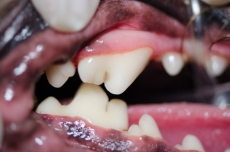What is peridontal disease?
If we do not regularly clean our teeth and brush away the plaque, the plaque will mineralise into tartar. Tartar is solid and gritty, it blocks oxygen from bathing the outer tooth and thus changes the environment and type of the bacteria that live around the tooth. These bacteria gradually destroy the tooth's attachment to the gum creating smelly pockets and eventually loose teeth.
Apart from the obvious problems with rotten and loose teeth, the bacteria of the mouth can spill over into the blood stream and put a strain on the heart valves, liver and kidney. It can lead to infection in these organs and virtually anywhere the bloodstream carries the bacteria.
Therefore it is not surprising that teeth require regular professional cleaning regardless of whether the mouth in question belongs to a person, a dog or a cat.
Oral hygiene is one of the most overlooked areas of medical care for animals. As we increase our knowledge of animal health, we realise that proper dental care does not just make your pet's breath smell better; it is mandatory for your pet's long term quality of life.
Dental disease is a treatable and preventable problem. Since your pet can not tell you how it feels, it is up to all of us, as members of your pet's health care team, to address this problem. Most people wait too long to get their pet's teeth cleaned professionally. Teeth cleaning should be consdidered a preventive measure.










